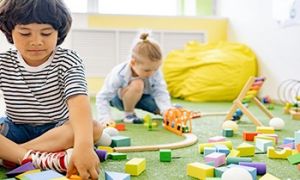Mindful praise helps children develop intrinsic motivation and confidence by focusing on effort, creativity, and problem-solving rather than just the outcome. Here are some alternatives to saying "Good job!".
Encouraging Effort & Persistence
- "You worked really hard on that!"
- "I can see how much effort you put into this!"
- "You kept trying even when it was tricky—great perseverance!"
Fostering Creativity & Problem-Solving
- "That was such a creative way to solve the problem!"
- "I love how you experimented with different ideas!"
- "Tell me about how you came up with this!"
Building Confidence & Independence
- "You figured that out all by yourself!"
- "You made a thoughtful choice!"
- "You should be proud of yourself!"
Encouraging Reflection & Growth
- "What do you think worked well?"
- "How did you feel when you finished?"
- "What would you like to try next?"
Mindful Praise Examples For Different Age Groups
Here are mindful praise examples tailored to different age groups:
Infants & Toddlers (0-3 years)
- Instead of: "Good job!"
- Try: "You worked so hard to stack those blocks!"
- Instead of: "You're so smart!"
- Try: "You figured out how to fit that puzzle piece—great thinking!"
Preschoolers (3-5 years)
- Instead of: "You're so creative!"
- Try: "I love how you mixed those colors to make something new!"
- Instead of: "You're a good listener!"
- Try: "I noticed how carefully you followed the steps—great focus!"
School-Age Children (5-12 years)
- Instead of: "You're really good at math!"
- Try: "I see how you kept trying different ways to solve that problem!"
- Instead of: "Nice drawing!"
- Try: "Tell me about what inspired you to create this!"
- Instead of: "You're so talented!"
- Try: "I admire the effort and dedication you put into this!"
- Instead of: "You're a great leader!"
- Try: "I noticed how you helped your team stay organized—great teamwork!"
Further Reading
Don't Say Good Job Posters
30 Positive Phrases Educators Should Say To Children







 As an Educator in Australia, your pay rate falls under the Children’s Services Award 2010. This award states the minimum amount that an employer can
As an Educator in Australia, your pay rate falls under the Children’s Services Award 2010. This award states the minimum amount that an employer can When working as a qualified Early Childhood Teacher (with a university degree) within a service, your rate of pay will come from the Educational Services
When working as a qualified Early Childhood Teacher (with a university degree) within a service, your rate of pay will come from the Educational Services When working as a Diploma Qualified Educator your pay rate is from the Children's Services Award 2010. This Award states your minimum rate of pay
When working as a Diploma Qualified Educator your pay rate is from the Children's Services Award 2010. This Award states your minimum rate of pay When working as a Cert 3 Qualified Educator, your pay rate is from the Children's Services Award 2010. This Award states your minimum rate of
When working as a Cert 3 Qualified Educator, your pay rate is from the Children's Services Award 2010. This Award states your minimum rate of Educational Leaders play a crucial role in their early childhood service by ensuring that the educational program aligns with best practices and supports the holistic
Educational Leaders play a crucial role in their early childhood service by ensuring that the educational program aligns with best practices and supports the holistic In early childhood education and care, ratios are more than a technicality—they are a frontline safeguard. Every child deserves responsive supervision, emotional connection, and developmental
In early childhood education and care, ratios are more than a technicality—they are a frontline safeguard. Every child deserves responsive supervision, emotional connection, and developmental With the new national child safety reforms kicking in on 1 September 2025, early childhood services like yours have a real opportunity to lead the
With the new national child safety reforms kicking in on 1 September 2025, early childhood services like yours have a real opportunity to lead the Here’s a comprehensive Mobile Phone and Smart Watch Policy tailored for early childhood education and care (ECEC) services in Australia, aligned with the latest 2025
Here’s a comprehensive Mobile Phone and Smart Watch Policy tailored for early childhood education and care (ECEC) services in Australia, aligned with the latest 2025 The Sea of Fish Challenge is a national initiative that invites children, educators, families, and communities to create and display fish artworks as a symbol
The Sea of Fish Challenge is a national initiative that invites children, educators, families, and communities to create and display fish artworks as a symbol Across the early childhood education and care sector, educators are sounding the alarm: current staffing ratios are insufficient to deliver safe, meaningful, and developmentally appropriate
Across the early childhood education and care sector, educators are sounding the alarm: current staffing ratios are insufficient to deliver safe, meaningful, and developmentally appropriate


